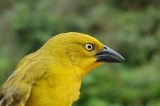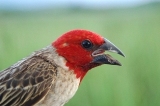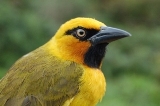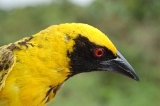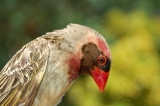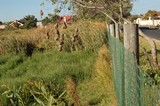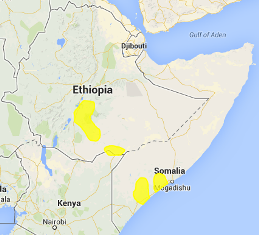Weaver species
Choose different species from drop-down list and press 'Go' button. See Full species list.Juba Weaver Ploceus dichrocephalus
IUCN: Least concern Discovery: 098Categories:
News items about species
Discovery
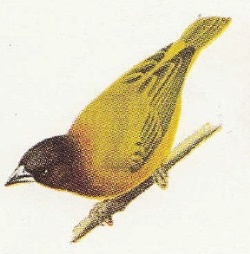
figure from Mackworth (1955) 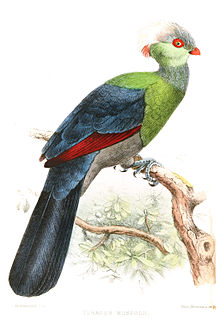
figure from Wikipedia 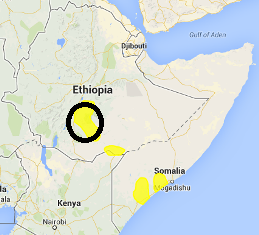
distribution, type locality circled IntroductionThe Juba Weaver was formally described by Tommaso Salvadori, an Italian zoologist and ornithologist who published at least 300 ornithological papers.The Juba Weaver was collected by Prince Eugenio Ruspoli, an Italian aristocrat (descendent of the famous noble family in Rome) and naturalist. Ruspoli explored the region between Ethiopia and Somalia during two visits, the first being in 1891. During his second expedition to north-east Africa (1892-1893) he explored the regions around Lake Rudolf. Ruspoli collected only 35 specimens of 32 species (Salvadori 1896). On 4 December 1893 he was killed by an elephant while hunting around Lake Bissan Abbaia (Abaya), north-east of Lake Stefania. The specimens Ruspoli had collected, including birds, insects, reptiles and mammals, were sent to the Museum of Genoa in Italy, but the specimens were in bad condition and without proper labels. Salvadori recognised 3 new species: Juba Weaver, Salvadori's Serin Serinus xantholaema, and Ruspoli's Turaco Turacus ruspolii. Although the type locality is often given as Somalia, these species would have been collected in present day Ethiopia. The first illustration of the Juba Weaver was of an adult male, published several decades after first description, by Mackworth (1955). The next illustrations were printed in field guides from 1995 onwards. Scientific citationHyphantornis dichrocephalus Salvadori 1896a, Ann. Mus. Genova 16(2), p.45, Italian Somaliland and Gallaland.Meaning of namesdicrocephalus, Greek: Dikhrous, two-coloured; -kephalos, headed.First English nameChestnut-headed Golden Weaver (Shelley 1905b).Alternate namesChestnut-headed Golden Weaver, Jubaland Weaver, Salvadori's Weaver, Somali Yellow-backed Weaver.CollectorPrince Eugenio Ruspoli.Date collected1892 or 1893.Locality collectedEthiopia.Type specimensThe type is in the Museum of Genoa. |
The above is based on Weaver Wednesday 2, a weekly series about the discovery of each weaver species.
This species text first appeared as
Weaver Wednesday [215] - Discovery [98]: Juba Weaver on 2016-07-27
1. Basic biology
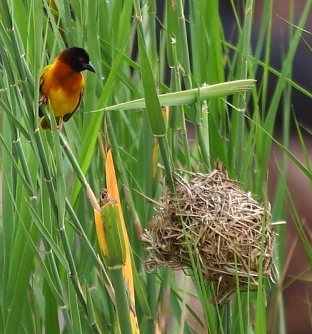
photographer János Oláh / Birdquest The female lacks yellow underparts of the male, has a buff breast and flanks, and brown eye. The female is best separated from the similar female Vitelline Masked Weaver by a 2-tone bill being dark above and light below. Distribution.
The Juba Weaver occurs in Ethiopia, Somalia and extreme NE Kenya but breeding is only known from Ethiopia (see map below, based on Birds of Africa). No races are recognised.
Habitat. The Juba Weaver inhabits riverine bush, short grass savanna, Acacia-Commiphora thornbush, and semi-desert savanna. Food. The Juba Weaver feeds on seeds, and probably also on insects. It is generally found in pairs and small groups. Breeding. The Juba Weaver is probably polygynous. It is colonial, nesting in small groups in trees or reeds. The nest is oval, with virtually no entrance tunnel. It is woven from grass, and lined with fine grass. The nest is suspended from the tip of a branch or at side of a reed. The eggs (clutch 2) are pale greenish-blue or greyish-green, spotted with brown and lilac. Nothing else is known about breeding. |
The above is based on Weaver Wednesday, a weekly series about weaver species.
This species text first appeared as
Weaver Wednesday [95]: Juba Weaver on 2014-04-09
2. Breeding facts
| Pair bond Probably polygynous Breeding season Mar in Ethiopia Nest site in trees or reeds; suspended from tip of branch or at side from a single reed Nest building no information Colony size Colonial, nesting in small groups Clutch size 2 eggs Egg colour pale greenish blue or greyish green, spotted with brown and lilac Egg size size 20.5 x 14.5 mm (one egg from Ethiopia) Incubation no information Chicks and nestling period no information |
Breeding information based on Handbook of the Birds of the World, Vol. 15.
3. Photos of Weaver Nests
 Vm 20181 |
Thumb-nails of most recent PHOWN records - click on one to see its full record
See all PHOWN records for this species here.
PHOWN (Photos of Weaver Nests) provides valuable info on breeding distribution and colony sizes of weavers.
You can contribute by registering and submitting photos at Virtual Museum webpage.
4. Breeding distribution
Google map showing distribution (For species with small ranges you need to zoom in at the correct area to see the range):
yellow blob - range of weaver species; read more about this here.
![]() - PHOWN records with photos
- PHOWN records with photos
![]() - PHOWN records with no photos (Nest Record Cards, other records)
- PHOWN records with no photos (Nest Record Cards, other records)
![]() - Birdpix records
- Birdpix records
![]() - comments on out of range records, or interesting records
- comments on out of range records, or interesting records
![]() - type locality
- type locality
CLICK on the marker on the map to see individual record details.
5. Range changes
Not South African speciesThe above is based on Weaver Wednesday 3, a weekly series about range changes in South African weaver species.
This species text first appeared as
n/a
